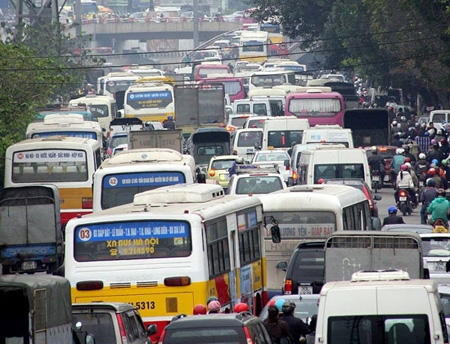ADB gets poor infrastructure on track
 As part of its efforts, ADB announced that it would provide a $20 million loan from its Asian Development Fund for Vietnam’s Public Private Partnership (PPP) Support Project, which is expected to increase private sector investment in infrastructure sector.
As part of its efforts, ADB announced that it would provide a $20 million loan from its Asian Development Fund for Vietnam’s Public Private Partnership (PPP) Support Project, which is expected to increase private sector investment in infrastructure sector.
“The project will use the fund for establishment of a project development facility that would help bring bankable PPP projects to the market,” the bank stated in an announcement.
“Provision of adequate physical infrastructure is a necessary condition to ensure the country’s economic growth and people’s access to services and opportunities,” said Tomoyuki Kimura, ADB country director for Vietnam.
“The challenge then is how to mobilise the financing needed to develop infrastructure, and clearly this will largely rely on encouraging more private sector investment, such as through well placed public financing coupled with support to overcome policy, institutional, information and risk barriers to investment,” he added.
It is estimated that from now to 2020, Vietnam will need $160 billion to develop the country’s infrastructure network including transport systems, bridges, power plants, water supply facilities, waste treatment plants and ports.
Meanwhile, traditional capital sources such as the state budget, government bonds and official development assistance from international donors only help satisfy half of this funding demand.
This means that more than 50 per cent of investment must be mobilised from domestic and foreign investors. And the government expects to attract more private investments via PPP
According to ADB, Vietnam’s ministries and government agencies would use the project development facility to fund PPP project preparation activities including pre-feasibility studies, full feasibility studies and the engagement of transaction advisors who would structure deals to bring to the private sector for bidding.
Apart from supporting the project development facility fund, ADB announced to provide $130 million loan to help transform the corridor towns of Dong Ha, Lao Bao and Moc Bai into economic hubs by improving urban environmental infrastructure and strengthening institutional capacities of provincial and local authorities.
This loan aims to enhance the competitiveness of towns along the East-West and Southern Economic Corridors and support the development of the Greater Mekong Subregion (GMS) transport corridors into vibrant economic corridors. The GMS Corridor Towns Development Project will finance 10 subprojects in the three towns, according to ADB.
What the stars mean:
★ Poor ★ ★ Promising ★★★ Good ★★★★ Very good ★★★★★ Exceptional
 Tag:
Tag:
Related Contents
Latest News
More News
- Hermes joins Long Thanh cargo terminal development (February 04, 2026 | 15:59)
- SCG enhances production and distribution in Vietnam (February 04, 2026 | 08:00)
- UNIVACCO strengthens Asia expansion with Vietnam facility (February 03, 2026 | 08:00)
- Cai Mep Ha Port project wins approval with $1.95bn investment (February 02, 2026 | 16:17)
- Repositioning Vietnam in Asia’s manufacturing race (February 02, 2026 | 16:00)
- Manufacturing growth remains solid in early 2026 (February 02, 2026 | 15:28)
- Navigating venture capital trends across the continent (February 02, 2026 | 14:00)
- Motivations to achieve high growth (February 02, 2026 | 11:00)
- Capacity and regulations among British areas of expertise in IFCs (February 02, 2026 | 09:09)
- Transition underway in German investment across Vietnam (February 02, 2026 | 08:00)






















 Mobile Version
Mobile Version